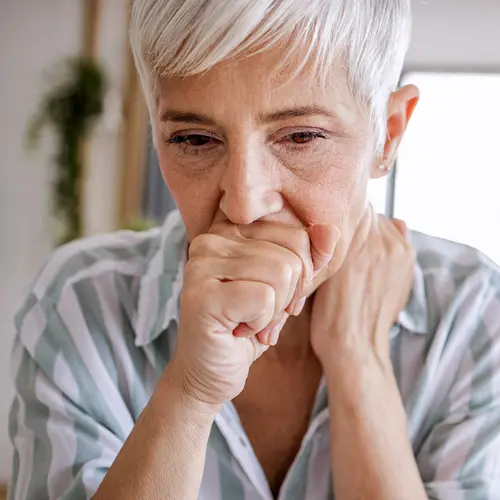When Surgery Isn’t Possible With Lung Cancer

Hide Video Transcript
Video Transcript
IOANA BONTA
Hi, Ms. Williams. How are you doing? CATHY WILLIAMS
I am doing good, Dr. Bonta. Since surgery wasn't an option, how did you come up with my treatment? IOANA BONTA
So very good question, Ms. Williams. Inoperable patients are inoperable because either the cancer is more advanced or the patient has other conditions where patient cannot have a decent quality of life after the surgery. And other times, there are other co-morbidities that will not allow patients to go under anesthesia. We both decided that it will be better to go with the clinical trial, which was radiation SBRT followed by immunotherapy. This specific radiation called stereotactic body radiation therapy treats the tumor with very limited toxicities, to the areas around it. So highly precise radiation fields.
Overall, how are you feeling?
CATHY WILLIAMS
I did get some news that I'm in remission now. Glad to hear that. But overall, I'm doing really good. IOANA BONTA
I'm glad you're doing well. And I know that you will continue to do well. CATHY WILLIAMS
How do I know do I stay in remission or is the cancer coming back? IOANA BONTA
We have scans every three months, as part of the clinical trial protocol. However, for patients who are not on a clinical trial, we recommend follow up after the completion of therapy, with a physical exam and a chest CT with or without contrast, every six months for two to three years. If followed by a physical examination and a low dose, non-contrast CT annually, for at least five years. But many times we follow patients beyond five years. CATHY WILLIAMS
What can I do for fatigue to improve my energy level? IOANA BONTA
Fatigue is one of the most common side effects of both the cancer and the treatment. First of all, we have to check and make sure this is not the cause, the fatigue is not caused by any hormonal dysregulation. So if we don't find any organic cause, then it's mostly a lifestyle change or modification. We encourage people to be active. Twenty minutes of exercise, moderate exercise. And also having a balanced diet. A little bit of fruit, a little bit of vegetables. And make sure you get plenty of vitamin D. Also, we encourage people to always check the vital signs.
Having to manage all the appointments, it adds stress. Having support groups, talking to other people, it's very helpful. We encourage people to build a support system. Know who your support system is.
CATHY WILLIAMS
What are some of the advancement treatments for lung cancer? IOANA BONTA: So over the last few years, we have seen significant advancements. There is a multitude of new therapeutics, new drugs, for patients who cannot have surgery. We know that immunotherapy after the radiation actually prolongs overall survival, which is something that we want to see.
Fortunately, we found your cancer early. We're able to treat you with the hope to cure this cancer. However, other patients that are not inoperable, they may be so because they were more advanced stage.
In this situation, there's also a lot of advancement these days. We do a genomic testing. And we now have several mutations that can be treated with specific medications, called targeted therapy.
CATHY WILLIAMS
Dr. Bonta, thank you for talking with me today. IOANA BONTA
Ms. Williams, you're the star. It's been a pleasure speaking with you. 